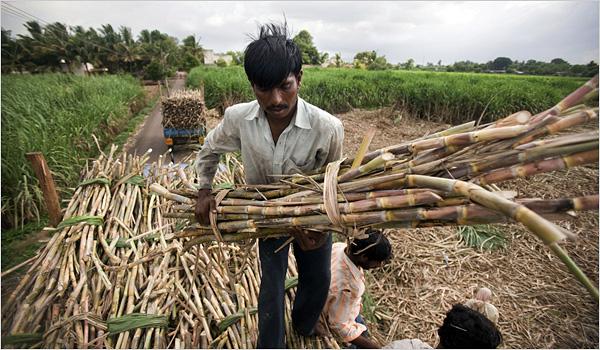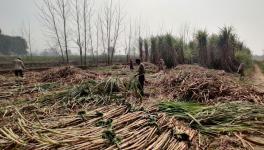Centre’s Rs 7,000 Crore Package for Sugar Sector will be a Sweet Deal for Private Mills

Image Courtesy : Global Farmer Network
The Narendra Modi government on Wednesday announced a relief package worth Rs 7,000 crore to resolve "the crisis of sugar sector". The package, divided into three parts, involves the Centre creating a buffer stock of 30 LMT of sugar for one year at a cost of Rs.1,175 crore. The other two components are fixing a minimum selling price for sugar and diversion of excess stock for ethanol production. However, it is unclear if the amount to be invested is enough and whether the money alone can solve the problems of the sector in the absence of structural interventions.
"The reimbursement under the scheme would be made on a quarterly basis which would be directly credited into farmers’ accounts on behalf of mills against their cane price dues," said a statement issued by the Press Information Bureau. The minimum support price will be Rs 29 per Kilogram. The move, intended to keep prices under control, also fixes a maximum production quota for sugar mills.
In order to increase the consumption of the additional stock of sugarcane, the Centre will upgrade the distilleries attached to sugar mills by installing incineration boilers. New distilleries will also be set up in mills. The government will also help the sugar mills bear the interest burden up to an amount of Rs. 1,332 crore on Rs. 4,440 crore worth of loans from banks over a period of three years.
The package comes days after the Bharatiya Janata Party faced a humiliating defeat in Kairana Lok Sabha bypolls in Uttar Pradesh. A key contributor to the defeat is believed to be the unhappiness of sugarcane farmers, who are still waiting for payments from mills against their crops.
Farmers and experts feel it is the mills that may significantly benefit from the package. Talking to NewsClick, Arun Rana, a sugarcane farmer from Saharanpur, said "I have received payments for the crop sold till 31st December. But I am still awaiting the payment for the produce sold till May. The sugar mills have been twisting the government’s arm by saying they are in the red and cannot pay us the money. At the same time, we see that their profits have increased. Their capital and reserve funds have increased over the years."
He added that in the event of delayed payment, the mills were supposed to give the farmers interest but often did not do so. He was hopeful that some of the benefits of the package would trickle down to the farmers but added that there were many structural issues with the industry, including the role of the cooperative societies.
The cooperative societies play a key role in the procurement process. The farmers are not allowed to sell their produce directly to the mills. They need to approach their cooperative societies, who, in turn, issue them slips authorising the sale of their produce to mills on government rates. A farmer, without the slip, often ends up being forced to sell his produce below these rates. There have been allegations of corruption in this process with even those without any produce getting the slips. These individuals then sell their slips to farmers for a hefty price.
Many farmers do not even have the option of planting other crops such as rice or wheat due to the risk of devastation by antelopes and wild pigs. Sugarcane is also economical for farmers as the cost of sowing is nil in the second and third year as it is not uprooted at the time of harvesting, Rana said. Thus, the farmers are caught in a cycle from which escape is difficult.
D. P Singh, a Central Committee member of All India Kisan Sabha, said the owners of sugar mills had received benefits from the government but had not paid the farmers their dues. Responding to the current package, he said it was not enough as the sugar mills needed to pay Rs 23,000 crore to to farmers all over India. Uttar Pradesh alone accounts for half of the dues (Rs 13,367 crore).
Singh added that the mills had been acquiring the produce but it was the government that was paying, which was definitely not a good precedent.
Get the latest reports & analysis with people's perspective on Protests, movements & deep analytical videos, discussions of the current affairs in your Telegram app. Subscribe to NewsClick's Telegram channel & get Real-Time updates on stories, as they get published on our website.
























